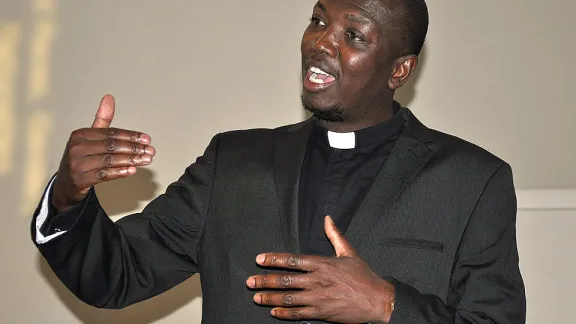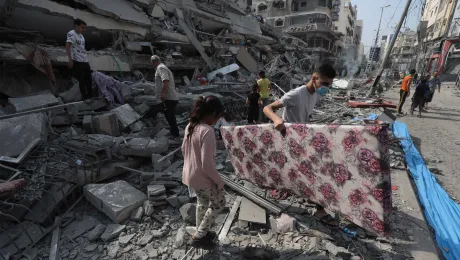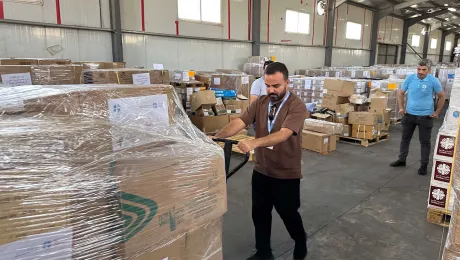
Rev. Dr Mogomme Masoga (South Africa) urges the churchâs active involvement in the global fight against human trafficking. © LWF/Stanley Kwenda
Call for Awareness Raising in Congregations and Cooperation with Governments
Tariro Dube, 19, (not her real name) vividly remembers how she and her two friends were offloaded from an Air Zimbabwe plane at the Harare International Airport in 2008.
Their planned destination was China, where they would work in garment industries. Their journey started with a simple newspaper advert with promises of lucrative jobs, but alert anti-trafficking police officers saved them from human traffickers.
Human trafficking was one of the topics debated extensively at a regional consultation of The Lutheran World Federation (LWF), held 5 – 9 November in the Zimbabwean capital Harare. The 34 participants represented the LWF Department for World Service (DWS) country and associate programs in the Southern Africa region, LWF member churches within the Lutheran Communion in Southern Africa (LUCSA), related agencies and invited speakers on specific topics.
From the case study presentations and other reports, participants discussed how churches and faith-based organizations can strategically contribute to initiatives that prevent and stop human trafficking, and other forms of forced migration.
The United Nations Convention on Transnational Organized Crime and its protocols describe human trafficking as the acquisition of people by improper means such as force, fraud or deception, with the aim of exploiting them. It is different from smuggling migrants which involves procuring for material benefit the illegal entry of a person into a state of which that person is not a national or resident.
According to the International Organization for Migration (IOM), human trafficking generates an estimated USD 10 billion annually. Statistics indicate that out of the 12 million people trafficked annually about 80 percent are women and children. They end up in illegal adoptions, forced marriages, child labor, domestic servitude in agriculture and construction, sexual exploitation and prostitution, or as sources of human organ trafficking.
“Human trafficking is a modern kind of slavery reappearing again. There are a lot of people out there who seek fortune out of other people’s lives and indeed we have to ask ourselves as World Service and the church: How can we help to prevent the scale of suffering of the people in these situations? After all it’s the church, the pastor’s door where people knock for help,” remarked Rev. Eberhard Hitzler, DWS director.
Porous Borders, Weak Legislation
In Southern Africa where DWS has country programs in Angola, Mozambique and Zambia, and associate programs in Malawi, South Africa, Swaziland and Zimbabwe, human trafficking and smuggling are prevalent largely because of porous borders and poorly enforced laws.
Allet Sibanda, Child Protection Officer at the UN Children’s Fund (UNICEF) in Harare, explained the human trafficking phenomenon. “People who specialize in the business of smuggling people across borders sometimes become human traffickers, and children always suffer the most because of their vulnerability. [This] is made even worse by the ‘culture of child exploitation’ in our societies. Sending a 13 year-old child to go and [look for] work is exploitation because the child does not choose to go and work,” she said.
Evangelical Lutheran Church in Southern Africa (ELCSA) pastor Rev. Dr Mogomme Masoga pleaded for the church’s active involvement in the global fight against human trafficking, including holding governments accountable. “We are being reactionary [rather] than being proactive. In Johannesburg and Pretoria people are being trafficked for prostitution and pornography, forced labor in farms, and forced [to] beg around South Africa’s rich suburbs,” he said.
Masoga’s sentiments were echoed by Tapfumanei Kusemwa, IOM counter trafficking officer, who challenged the church’s accountability in ensuring that the money received from congregation members is not tainted.
“The church can do so much in raising awareness, especially in supporting survivors of human trafficking. Churches are a base for awareness and sensitization,” said George Mkanza, LWF/DWS country representative for Mozambique.
The different steps taken to combat human trafficking at both international and regional levels do not seem to be deterrent enough, participants heard. “It’s an organized business, clandestine and low cost, investigations are ad-hoc, and penalties against offenders are lenient. There is victim intimidation, corrupt officials work with syndicates, there are language barriers, victims are afraid and police officers are untrained,” said Kusemwa.
Some Positive Steps
Participants at the meeting largely agreed that countries in the Southern African region need to tighten legislation to fight this phenomenon. And there are some positive steps. “South Africa now requires anyone travelling with a child to have an affidavit showing that both parents have consented to the child’s travel,” said Sibanda.
Angola also prescribes to this requirement. Abrao Mushavi, DWS Angola, encouraged churches to “create alliances with like-minded organizations working to fight human trafficking and seek to address the root causes such as widespread poverty in our societies.”
The DWS associate program in Zimbabwe, Lutheran Development Service, hosted the meeting, which was also addressed by Presiding Bishop Stephen M. Dube of the Evangelical Lutheran Church in Zimbabwe.


